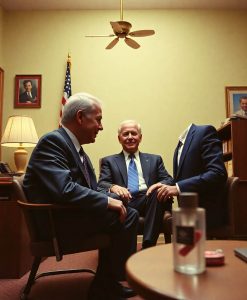—
How Does It Feel When Facing a Serious Diagnosis Like Prostate Cancer?
There’s a quiet moment when you notice something isn’t quite right—a sensation in your body that whispers, “something’s different.” Maybe it’s a subtle ache, a shift in energy, or a heaviness that lingers just beneath your skin. These physical signals are our body’s gentle way of trying to tell us that change is on the horizon. For someone like President Joe Biden, who recently received the news of Stage 4 prostate cancer, these sensations might be intertwined with a flood of emotions—hope, uncertainty, resilience.
When a trusted friend or family member shares that they believe someone will be “OK,” it’s often rooted in a mixture of hope and a deep sense of connection. But what does “being OK” really feel like when navigating a life-changing health diagnosis? It’s a nuanced experience, one that involves more than just medical facts. It’s about sensing into the body’s resilience, the quiet strength that exists beneath the worry, and the hope that persists even in the face of uncertainty.
Living with the awareness of a serious diagnosis, like prostate cancer, can often begin as a subtle awareness—an internal whisper that prompts us to pay closer attention to how we feel physically. It might be a gentle tightening in the chest, a sense of steadiness in the gut, or a breath that feels a little shallower than usual. These sensations are the body’s way of anchoring us in the present moment, reminding us of our physical existence and the strength that resides within.
For someone like President Biden, who has a long history of public service and personal resilience, the physical sensations accompanying such news may shift over time. The initial shock might give way to a sense of steadiness—an embodied feeling that, despite the diagnosis, life continues. It’s in these moments of bodily awareness that hope can be rooted, not just as a fleeting emotion but as a tangible, grounding presence felt deep within.
Understanding how our body responds to difficult news can help us find a sense of calm and clarity. Recognizing sensations of tension, warmth, or even fleeting moments of relief can serve as anchors. They remind us that even amid uncertainty, our physical selves carry resilience—a subtle but powerful force that sustains us through challenges.
For those supporting loved ones facing serious health issues, paying attention to these bodily signals becomes a way of offering comfort. When we notice someone’s quiet signs of strength—perhaps a steady breath or a calm posture—we see the embodied hope that persists beyond words. It’s a reminder that the human body, with all its sensations and subtle cues, is a remarkable vessel of resilience.
In the end, the journey through a diagnosis like prostate cancer is deeply personal and uniquely embodied. It’s about tuning into those quiet signals that tell us we are still here, still capable, and still hopeful. While the medical details matter, so does our awareness of how our body holds, heals, and moves forward—step by step.

Living with the knowledge of a serious health challenge isn’t just about coping intellectually; it’s about feeling into the physical experience of hope, strength, and resilience. These sensations are a vital part of the human story—one that continues even in the most difficult of times.
Learn More: Biden Friend: Family Thinks He Will Be OK
Abstract: Former Rep. Bob Brady, D-Pa., a longtime friend of former President Joe Biden, said Biden’s family told him they believe he will be OK despite his recent diagnosis of Stage 4 prostate cancer, Politico reported.
Link: Read Full Article (External Site)
